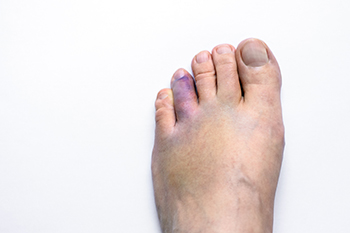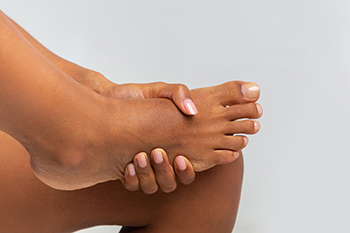
Diagnosing a broken toe involves recognizing symptoms such as intense pain, swelling, bruising, and difficulty walking. Types of toe fractures include stress fractures, where small cracks form from repetitive stress, and traumatic fractures, resulting from a direct blow or impact. A doctor will perform a physical examination and may order X-rays to confirm the diagnosis and determine the fracture type. Relief options for a broken toe include rest and elevation to reduce swelling and pain. Depending on the type of fracture, buddy-taping the injured toe to an adjacent toe may provide support and alignment during healing. Wearing stiff-soled shoes can protect the toe and ease walking. In severe cases, a cast or surgery may be necessary to ensure proper healing. If you have fractured your toe, it is suggested that you consult a podiatrist who can guide you toward a comprehensive treatment plan.
Broken toes may cause a lot of pain and should be treated as soon as possible. If you have any concerns about your feet, contact Gregory T. Loo, DPM from Elite Podiatry. Our doctor will treat your foot and ankle needs.
What Is a Broken Toe?
A broken toe occurs when one or more of the toe bones of the foot are broken after an injury. Injuries such as stubbing your toe or dropping a heavy object on it may cause a toe fracture.
Symptoms of a Broken Toe
- Swelling
- Pain (with/without wearing shoes)
- Stiffness
- Nail Injury
Although the injured toe should be monitored daily, it is especially important to have a podiatrist look at your toe if you have severe symptoms. Some of these symptoms include worsening or new pain that is not relieved with medication, sores, redness, or open wounds near the toe.
If you have any questions, please feel free to contact one of our offices located in Ahwatukee, and Phoenix, AZ . We offer the newest diagnostic and treatment technologies for all your foot care needs.

Multiple sclerosis, or MS, can significantly impact foot health due to its effects on the nervous system, leading to various symptoms. Common foot issues can include numbness or tingling, muscle weakness, and difficulty with balance and coordination. These symptoms can contribute to challenges in walking, increased risk of falls, and potential development of foot deformities like claw toes or foot drop. Managing MS-related foot issues involves a multidisciplinary approach, with visiting a podiatrist as an essential part. Podiatrists can assess foot function, and recommend appropriate footwear to improve stability and reduce pressure points. Regular podiatric care helps individuals with MS maintain optimal foot health, minimizing discomfort and improving mobility. If you have multiple sclerosis, it is suggested you visit a podiatrist who can help you manage this condition as it affects your feet.
Some foot conditions may require additional professional care. If you have any concerns, contact Gregory T. Loo, DPM of Elite Podiatry. Our doctor can provide the care you need to keep you pain-free and on your feet.
Rare Foot Conditions
The majority of foot conditions are common and can be treated by a podiatrist. Standard diagnostic procedures are generally used to identify specific conditions and treatment can be rendered. A podiatrist also treats rare foot conditions which can be difficult to diagnose and may need extra attention and care.
There are many rare foot conditions that can affect children. Some of these can include:
- Freiberg’s disease
- Kohler’s disease
- Maffucci syndrome
Freiberg’s disease - This can be seen as a deterioration and flattening of a metatarsal bone that exists in the ball of the foot. It typically affects pre-teen and teenage girls, but can affect anyone at any age. Symptoms that can accompany this can be swelling, stiffness, and the patient may limp.
Kohler’s disease - This often targets the bone in the arch of the foot and affects younger boys. It can lead to an interruption of the blood supply which ultimately can lead to bone deterioration. The patient may limp or experience tenderness, swelling, and redness.
Maffucci syndrome - This affects the long bones in a child’s foot leading to the development of abnormal bone lesions. They are benign growths and typically develop in early childhood and the bones may be susceptible to breaking.
A podiatrist can properly diagnose and treat all types of rare foot conditions. If your child is affected by any of these symptoms or conditions, please don’t hesitate to call our office so the correct treatment method can begin.
If you have any questions please feel free to contact one of our offices located in Ahwatukee, and Phoenix, AZ . We offer the newest diagnostic tools and technology to treat your foot and ankle needs.
 For runners, incorporating effective stretches into their routine is vital for performance and injury prevention. The downward dog stretch provides a full-body stretch, focusing on the calves and hamstrings, which helps prevent Achilles tendon injuries. Ankle mobility heel lifts help in strengthening and increasing the flexibility of the ankles, vital for running stability. Besides stretching, wearing proper running shoes cannot be overstated as it ensures adequate support and reduces the risk of injury. It is also important for runners to ease into their routines gradually, allowing their bodies to adjust and build endurance safely. If you have endured a foot or ankle injury while running, it is suggested that you contact a podiatrist who can treat various foot issues and guide you on effective running injury prevention techniques.
For runners, incorporating effective stretches into their routine is vital for performance and injury prevention. The downward dog stretch provides a full-body stretch, focusing on the calves and hamstrings, which helps prevent Achilles tendon injuries. Ankle mobility heel lifts help in strengthening and increasing the flexibility of the ankles, vital for running stability. Besides stretching, wearing proper running shoes cannot be overstated as it ensures adequate support and reduces the risk of injury. It is also important for runners to ease into their routines gradually, allowing their bodies to adjust and build endurance safely. If you have endured a foot or ankle injury while running, it is suggested that you contact a podiatrist who can treat various foot issues and guide you on effective running injury prevention techniques.
Exercising your feet regularly with the proper foot wear is a great way to prevent injuries. If you have any concerns about your feet, contact Gregory T. Loo, DPM of Elite Podiatry. Our doctor will treat your foot and ankle needs.
How to Prevent Running Injuries
Many common running injuries are caused by overuse and overtraining. When the back of the kneecap starts wearing out and starts causing pain in your knee, this is commonly referred to as runner’s knee. Runner’s knee is a decrease in strength in your quadriceps and can occur if you’re not wearing properly fitted or supporting shoes. To prevent runner’s knee, focusing on hip strengthening is a good idea, as well as strengthening your quads to keep the kneecaps aligned.
What Are Some Causes of Running Injuries?
- One cause of a common running injury is called iliotibial band syndrome.
- Plantar fasciitis is also another common injury.
- Stress fractures can occur from overtraining, lack of calcium, or even your running style.
Best Ways to Prevent Running Injuries
- Wear footwear that fits properly and suits your running needs.
- Running shoes are the only protective gear that runners have to safeguard them from injury.
- Make a training schedule. Adding strengthening exercises as well as regular stretching can help keep you strong and limber and can lessen the possibility of injuries.
- Stretching keeps muscles limber; this will help you gain better flexibility.
If you have any questions please feel free to contact one of our offices located in Ahwatukee, and Phoenix, AZ . We offer the newest diagnostic and treatment technologies for all your foot and ankle needs.










